Extended Abstract: Climate change and environmental degradation are worsening at an alarming rate. Greenhouse gases are increasing, the Earth is heating, and incidents of extreme weather, poverty, and infectious disease are rising (World Health Organization, 2019). These trends are largely due to overconsumption of food, fuel, water, and other resources (Burki & Tahir, 2022). Marketing is well-positioned to reverse environmentally harmful trends through demarketing and the promotion of sustainable consumption. To support this effort, researchers have identified and examined key predictors of pro-environmental attitudes and behaviors. Most of this research, however, has been conducted in developed, Western nations and often relies on the assumption that findings can be used to explain sustainable consumption behaviors in other countries. However, such an understanding is severely flawed, as cross-cultural research has demonstrated that sociocultural context is highly influential in sustainable consumption, and that countries are not homogeneous in their consumption motives (Muthukrishna et al., 2020).Griffith (2021) brings further attention to this issue and calls upon the international marketing community to investigate the use of standardization and adaptation strategies to promote sustainability in countries with different cultures. This conceptual paper answers this call by synthesizing research at the intersection of cultural psychology and sustainable consumption to develop a multilevel framework that accounts for country-level societal factors (e.g., cultural values), individual-level characteristics (e.g., personality traits), and interactions across levels (e.g., contextual influences; See Figure 1). By doing so, this paper seeks to help global marketers and policymakers implement change measures that account for the personal and socio-structural factors that affect sustainable consumption.
Growing evidence indicates that current consumption patterns are disrupting ecological systems and contributing to the global climate crisis. To address present and future environmental challenges, international marketers can utilize the tools of cultural psychology when considering whether to standardize or adapt marketing mix strategies designed to promote eco-friendly consumption practices. In fact, sustainable marketing and cultural psychology should be considered natural allies. Together, these two disciplines can provide richer insight into human action toward sustainability and the causes of the attitude-behavior gap. Prior research suggests that consumption decisions are often influenced by individual, social, and contextual factors that motivate attitudes, beliefs, and behaviors (Hackmann, Moser, & Clair, 2014). Therefore, a multi-level framework that accounts for the connections between these levels of factors can provide a deeper and more holistic understanding of sustainable consumption. There is much to be gained from integrating the key findings, theories, and perspectives from different literatures, as increasing pro-environmentalism globally requires novel interdisciplinary approaches. The multilevel framework presented in this paper provides a roadmap for corporations interested in designing marketing mix strategies (e.g., branding and marketing communications) that promote sustainable consumption behaviors across diverse national markets.

Funding statement
The author(s) received no financial support for the research, authorship, and/or publication of this article.
Conflict of interest
The author(s) declared no potential conflicts of interest with respect to the research, authorship, and/or publication of this article.





